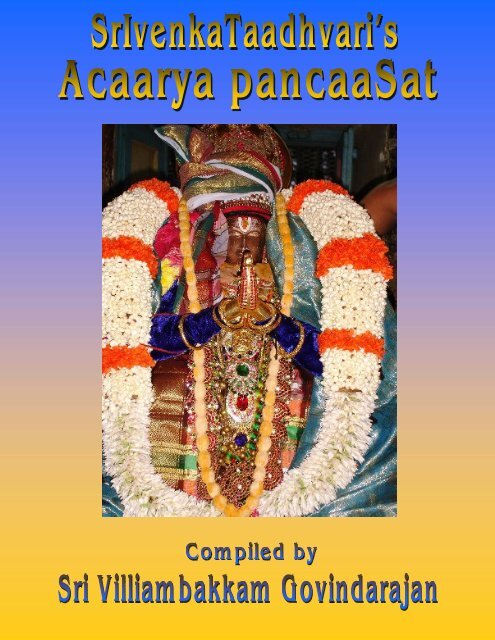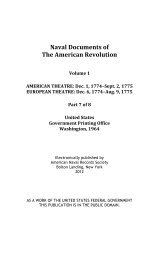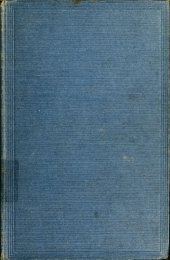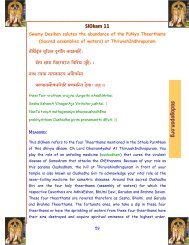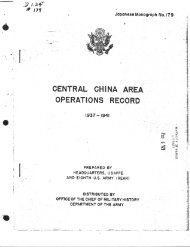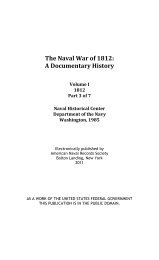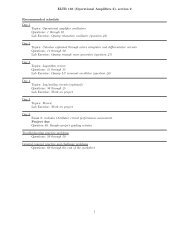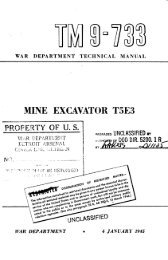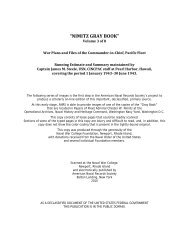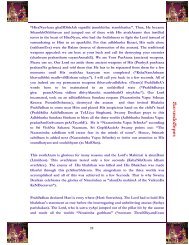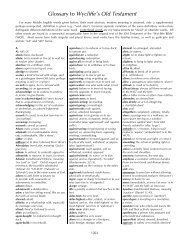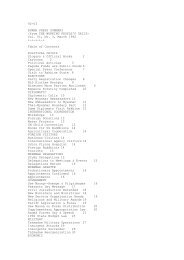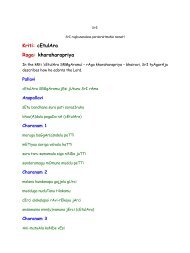Sadagopan.org - Ibiblio
Sadagopan.org - Ibiblio
Sadagopan.org - Ibiblio
Create successful ePaper yourself
Turn your PDF publications into a flip-book with our unique Google optimized e-Paper software.
<strong>Sadagopan</strong>.<strong>org</strong><br />
Sincere Thanks To:<br />
1. Sri nrusimha sEva rasikan, Oppiliappan kOil Sri. Varadachari SaThakopan<br />
svAmi, Editor-In-Chief of sundarasimham-ahobilavalli eBooks kaimkarayam for<br />
hosting this title in his series.<br />
2. Mannargudi Sri.Srinivasan Narayanan for providing the English Transliteration<br />
texts for the Sanskrit verses.<br />
3. Nedumtheru Sri.Mukund Srinivasan for providing the images<br />
4. Smt. Jayashree Muralidharan for eBook assembly
Introduction 1<br />
Slokams and Commentares 3<br />
Slokams 1 - 10 5 - 12<br />
Slokams 11 - 20 13 - 20<br />
Slokams 21 - 30 21 -31<br />
Slokams 31 - 40 31 - 40<br />
Slokams 41 - 50 42 - 51<br />
Slokams 51 - 55 53 - 56<br />
nigamanam 58<br />
Complete List of Sundarasimham-ahobilavalli eBooks 59<br />
<strong>Sadagopan</strong>.<strong>org</strong>
<strong>Sadagopan</strong>.<strong>org</strong>
EaI:<br />
��<br />
SlaoYayamakcaËvait- AstaokaQvair Aa~oyakulaitlak<br />
EaIrGaunaaqadIixatsya kumaaroNa<br />
EaIvao=\kTaQvairNaa ivaricatM<br />
SfElxymk ckfrvaftfti `sfEtakatfvai<br />
~tfEryKl tilkmf !rKnattIXitai[f Kmarra[<br />
!Evgfkdatfvai ;ybfbiy<br />
~caafypwfcaStf<br />
Sleshayamaka cakravarti astOkAdhvari AtrEyakulatilaka<br />
SrIraghunAthadeekshita’s kumArar’s SrIvenkaTaadhvari’s<br />
��<br />
<strong>Sadagopan</strong>.<strong>org</strong>
<strong>Sadagopan</strong>.<strong>org</strong><br />
ThUppul Desikan<br />
6
EaI:<br />
SrIvenkaTaadhvari’s<br />
��<br />
(The book was edited by Dr. A.K. Kale and published with introduction, translation,<br />
notes etc, in the V WORLD SANSKRIT CONFERENCE, Special number Varanasi,<br />
Oct. 21-26, 1981).<br />
INTRODUCTION<br />
��<br />
This is a PanchAsath (actually containing 55 verses) by the poet<br />
Venkatadhvarin in praise of Sri Vedantadesika, the foremost exponent of<br />
Visishtadvaita Philosophy. Vedantadesika gave a definite form to Sri Vaishnava<br />
Religion and Philosophy. He was a prolific writer and was much respected by the<br />
people not only for his literary, religious and philosophical writings and his<br />
extraordinary power to defeat his adversaries in religious and philosophical<br />
debates but also for his saintly and devotional personality. Vedantadesika’s<br />
admirers consisted not only of his contemporaries but also many who followed him<br />
even after a number of centuries. Venkatadhvari (who lived in 16 th and 17 th<br />
centuries AD) was one of the foremost admirers and devotees of Swamy Desikan,<br />
who lived for one hundred and one years from 1268 AD to 1369 AD.<br />
Venkatadhvari was also a direct descendant of Atreya Ramanuja, the Acharyan of<br />
Swamy Desikan. These two links - VamsatthAr and family links - inspired<br />
Venkatadhavari to create the fifty slOkams of eulogy named AchArya PanchAsat<br />
to record his high reverence for Swamy Desikan.<br />
Venkatadhvarin’s mother’s name was Sitaamba and father’s name was<br />
Raghunatha Dikshita; his father was himself a great scholar and poet and was<br />
1<br />
<strong>Sadagopan</strong>.<strong>org</strong>
<strong>Sadagopan</strong>.<strong>org</strong><br />
popularly known as Slesha-Yamaka-Chakravarthi. Raghunatha’s father Sri<br />
Srinivasa had numerous disciples and people mostly knew him and addressed him<br />
as Appaya-Guru. He was the sister’s son of Tatacharya, a well-known scholar of<br />
Kanchipuram. References to these family connections have been provided by Sri<br />
Venkatadhvarin himself in many of his writings including the present work, in<br />
which the 54 th verse describes the same.<br />
As a descendant of this vamsam, Venkatadhvarin was himself a great<br />
scholar, a renowned poet and a creative author of many extensive writings of<br />
different literary forms. He wrote a drama named Pradyumnanandam, three<br />
Champus named Visvagunaadarsa Champu, Uttara Champu and Varadabhyudaya<br />
Champu, a dvyasraya-kavya named Raghavayaadaviyam (Please see e-book # 42 in<br />
www.ahobilavalli.<strong>org</strong>), a big stotra containing 1000 verses known as Lakshmi<br />
Sahasram (Please see ebook #100 in www.sundarasimham.<strong>org</strong>) besides the present<br />
work under study now, which is an inspiring eulogy in praise of Vedantadesika’s<br />
vaibhavam. There are also a few other writings attributed to Venkatadhvarin but<br />
they are not so well-known.<br />
While the author has included few verses in praise of Sri Vedanthadesika in<br />
two other works of his, viz. Lakshmi Sahasram and Visvagunaadarsa Champu, it<br />
seems that he was not satisfied with the same and so he thought of lavishing<br />
praises on the AchAryan, by dedicating a complete work to Vedantadesika, whom<br />
he admired and respected the most. It may be mentioned in this connection that<br />
one of the verses contained in Visvagunadarsa Champu has been borrowed<br />
verbatim from the present work, viz verse no. 42.<br />
2
<strong>Sadagopan</strong>.<strong>org</strong><br />
Desika NAcchiyAr - Kanchi<br />
4
vao=\kTnaaqaM dovaM vaodantivahairNaM gauÉHca Bajao .<br />
XaoYaigairQauya-maaVM yaM ivadurnyaM %vaXaoYaigair Qauya-ma\ .. 1<br />
venkaTanAtham devam vedAntavihAriNam gurunca bhaje |<br />
SeshagiridhuryamAdyam yam viduranyam tvaseshagiri dhurayam || 1<br />
Meaning:<br />
EaI:<br />
I adore the deity as well as the preceptor, (both) bearing the name Venkatanatha,<br />
one pervading the Vedanta and the other plunging sublimely into Vedanta. The<br />
former is known as the lord of Seshagiri and the latter as the lord of all<br />
speeches. AXaoYaigairQauya-ma\ aSeshagiridhuryam - refers to Vedantadesika’s multi-<br />
lingual knowledge. Vedantadesika himself mentions this fact in the form of a<br />
dialogue between Sri Ramanuja as Guru and himself as Sishya in<br />
Sankalpasuryodaya.<br />
EaImaWo=\kTnaaqaa#yaaO saaQaucaËmahadra .<br />
prmaanandinalayaaO p`pVo dovadoiXakaO .. 2<br />
SrImat venkaTanAthAkhyau sAdhucakramahAdarA |<br />
parama Anandanilayau prapadye devedeSikau || 2<br />
Meaning:<br />
I take refuge in the deity as well as the preceptor, both of whom are known as<br />
Srimad (i.e. accompanied by Lakshmee in one case and endowed with glory in the<br />
other) VenkaTanatha, are marked with noble discus (Sudarsana) and big conch<br />
(Pancajanya) and are abodes of supreme bliss.<br />
5<br />
<strong>Sadagopan</strong>.<strong>org</strong>
<strong>Sadagopan</strong>.<strong>org</strong><br />
~atuM svayaM BauvaM jaatM ~yyanta#yaatgaaOrvama\ .<br />
XauBao ! BaagavatM santM stuih dovaM gau$M ca vaak\ .. 3<br />
trAtum svayam bhuvam jAtam trayyantAkhyAtagauravam |<br />
Subhe! bhAgavatam santam stuhi devam gurUm ca vAk || 3<br />
Meaning:<br />
O noble speech! Praise the virtuous BhAgavatAs, the deity and the preceptor,<br />
whose glory is well-known in the Vedanta and who themselves take birth for<br />
redemption of the universe.<br />
rsanaaM duna-roXaanaaM vaNa-naap=\kdUiYatama\ .<br />
Eau%yantdoiXakaodntsauQaaiBa: XaaoQayaamyahma\ .. 4<br />
rasanAm durnareSaanAm varNanaapankadUshitAm |<br />
Srutyanta deSikOdanta sudhAbhi: SodhayAmyaham || 4<br />
Meaning:<br />
My tongue which has been soiled with the praise of wicked kings, for material<br />
benefits, is now purified with the nectar of eulogizing Vedantadesika.<br />
(Eau%yantdoiXakaodnt SrutyantadeSikOdanta). This refers to a very interesting<br />
episode. VidyArNyaa, a great scholar of advaita, freed the princess of<br />
Vijayanagara kingdom from the possession of a Brahma-rakshasa. He was<br />
rewarded with the ministership of the kingdom. Vidyaranya invited Vedantadesika,<br />
who was leading a life of unchivrutthi, to the court of the king of Vijayanagara<br />
with a view to rid him (Vedantadesika) of poverty. Turning down the offer,<br />
Vedantadesika sent his reply in five verses, known as Vairagyapanchakam.<br />
6
sants~yyantsaUrInd`carNaWnWicantka: .<br />
Aaid`yantaimadM stao~mant:santmasaicCdma\ .. 5<br />
santa: trayyanta soorindra caraNa dvandvacintakA: |<br />
AdriyantAmidam stOtramanta: santamasacchidam || 5<br />
Meaning:<br />
May the wise, contemplating upon the two feet of the foremost of the Vedanta<br />
sages, honour this stotra (eulogy) which is the destroyer of inner darkness<br />
(ignorance).<br />
QanaayaavaOyaa%yap`Bavakujanastao~rcanaa¹<br />
GanaayaasaaoiWgna: pirmauiYattap~yaBayama\ .<br />
bauQaamaaodao%padxamainagamacaUDagauÉkqaa¹<br />
sauQaapaqaaoraiXaM sauicarmavagaaho|hmaQaunaa .. 6<br />
dhanAyAvaiyAtya prabhavakujana stotra racanA-<br />
ghanAyAsOdvigna: parimushita tApatrayabhayam |<br />
budhAmOt udpAda kshamanigama cooDagurukathA-<br />
sudhApAthOraaSim suciramavagAhe aham adhunA || 6<br />
Meaning:<br />
Tired on account of great exertion caused by unabashedly composing verses due<br />
to greed, in praise of undeserving persons, I, now plunge myself into the ocean of<br />
the nectar of Vedantadesika’s life-story which is capable of delighting wise men<br />
7<br />
<strong>Sadagopan</strong>.<strong>org</strong>
<strong>Sadagopan</strong>.<strong>org</strong><br />
and also those who are free from all kinds of miseries.<br />
pura|kUparxmaaQargaNaaoVanapvana¹<br />
smaraidxaaodIyaaogauNakqanainaiva-NNarsana: .<br />
inabaQnaaima EaImainnagamamakuTaya-stvaimamaM<br />
xamantaM QaImant: @vaicadcaturaM vaacamaip mao .. 7<br />
purA akoopArakshmAdharaNodyAnapavana-<br />
smarAdi kshOdiyOgunA kathana nirviNNarasana: |<br />
nibadhnAmi SrImat nigmamakuTaarya: tavamimam<br />
kshamantAm dheemanta: kvacidacaturAm vAcamapi me || 7<br />
Meaning:<br />
I, whose tongue had become benumbed before by describing insignificant<br />
characteristics of oceans, mountains, gardens, breezes, cupid (kaama) etc., (now)<br />
compose this praise (stave) of Srimaan Vedantadesika. The scholars should<br />
f<strong>org</strong>ive my speech if it is found unskilled anywhere.<br />
@va vaacaamaacaaya-: kivakqakkNzIrvagauÉ:<br />
@va caa|h naIcaa%maa i~caturvaca:svaPyacatur: .<br />
inarakR%ya va`IDaM inapuNapirhasaaopjainataM<br />
tdIyastao~o maaM tdip ikla Bai>s%varyait .. 8<br />
8
Swami Desikan - Satyagalam<br />
9<br />
<strong>Sadagopan</strong>.<strong>org</strong>
<strong>Sadagopan</strong>.<strong>org</strong><br />
kva vAcAm AcArya: kavikathakakaNThIrava guru:<br />
kva cA aha neecAtma tricaturavaca: svapyacatura: |<br />
nirAkrtya vreeDaam nipuNa parihAsOpajanitAm<br />
tadiya stOtre mAm tadapi kila bhakti: tvarayati || 8<br />
Meaning:<br />
On the one side is the master of all speech, lion among poets and logicians, and the<br />
preceptor and on the other am I, an evil-minded person unskilled in properly<br />
making even three or four utterances. Still the devotion is prompting me to<br />
hasten to his praise by dispelling shyness caused by the ridicules of others. The<br />
title kivataik-kisaMh: (kavitaarkikasimham - lion among poets and logicians) was<br />
given to him by Sudarsana Bhatta, author of Srutha Prakasika a renowned<br />
commentary of Sribhashya of Ramanuja, and other scholars of Visishtadvaitha,<br />
since he had no match in the field of poetry and Sastras.<br />
kivakqakkNzIrvagauÉ: kavikathakakaNThIravaguruh Vedantadesika acknowledges<br />
himself to be the bearer of similar titles (pattam) in some of his works such as<br />
Yatiraja Saptathi sloka no. 72, HayagrIva Stotra 33, acyutasataka 101, Catusloki<br />
Bhashyam last verse, Raghuveera Gadyam last verse, GarudapancaSat–52,<br />
Stotraratna Bhashyam last verse, Yadavabhyudayam 24.97. Guruparampara<br />
prabhava describes a few episodes regarding this title –<br />
• Krishnamisra, a scholar-poet from North came for Sastrartha debate with<br />
Vedantadesika. Vedantadesika defeated him in a three-day debate.<br />
Thereafter, Krshna Misra, proposed to show his vanquisher the drama that he<br />
had created with the title of Prabhodha-Chandrodayam. Vedantdesika in turn<br />
created his own kaavya-naatakam named Sankalpa-Suryodaya. Vedantadesika<br />
created this Sri Sookthi without awareness of the content of Prabodha-<br />
Chandrodaya during the very night of his victory in debate. Vedanta Desika<br />
wrote his drama Sankalpa-suryodaya and refuted soundly the thesis of<br />
10
Prabodha-chandrodaya, which housed the doctrinal views of Krshna Misra. The<br />
astonished Krshna Misra, realized the appropriateness of the title “Kavitarkika-simha”<br />
for Swamy Desikan.<br />
• Hearing about the defeat of Krishna Misra, a poet named Dindima came and<br />
showed his Ramabhyudaya to Vedantadesika. Vedantadesika also showed him<br />
Yadavabhyudaya and Hamsasandesa. Dindima prostrated before Swamy<br />
Desikan and declared him to be the rightful holder of the title of Kavitarkika-Simha.<br />
(NOTE: Annotated Commentaries in English for the following ebooks can be<br />
found in www.ahobilavalli.<strong>org</strong> :<br />
• YatirAja Saptati - Ebook # 7<br />
• Achyutha Satakam - Ebook # 18<br />
• Yadhavabhyudayam - Ebook # 43<br />
Annotated Commentaries in English for the following ebooks can be<br />
found in www.sundarasimham.<strong>org</strong> :<br />
• HayagrIva Stotra - Ebook # 4<br />
• Raghuveera Gadyam - Ebook # 5<br />
• Stotraratna - Ebook # 49 )<br />
inaYaVa ivaVanaaM inaiKlakumaitvyaalagaÉD:<br />
saBaa saaOBaagyaanaaM sarsakivatapd\masaivata .<br />
p`maaNaM BaaYyasya p`pdnaklaajanmajalaiQa:<br />
kraotu xaomaM na: kivakqakkNzIrvagauÉ: .. 9<br />
11<br />
<strong>Sadagopan</strong>.<strong>org</strong>
<strong>Sadagopan</strong>.<strong>org</strong><br />
nishadyA vidyAnAm nikhila kumativyAlagaruDa:<br />
sabhA saubhAgyAnAm sarasakavitApadmasavitA |<br />
pramaaNam bhAshyasya prapadana kalAjanma jaladhi:<br />
karOtu kshemam na: kavikathaka kaNThIravaguru: || 9<br />
Meaning:<br />
May the preceptor, who is a lion among poets and logicians, a receptacle of all<br />
learning, a Garuda for all evil-minded snakes, an assemblage of good fortunes, Sun<br />
for lotuses of beautiful poetry, an authority on the Sribhashya (of Ramanjuja) and<br />
an ocean producing the art of Saranagati, bestow immense auspiciousness upon us.<br />
kraO baQnana\ Ba@%yaa kivakqakisaMhaya-gaurvao<br />
namasyaa: kuva-o|hM nativatitmandartrvao .<br />
p`banQaas~yyantp`caurtrsaaOBaagyajaiTlaa:<br />
p`qanto ya%@;Pta: p`itBaTcapoTahitkRt: .. 10<br />
karau badhnan bhaktyA kavikathaka simhAryagurave<br />
namasyA: kurve aham natavitatimandAratarave |<br />
prabandhAstrayyanta pracuratara saubhAgyajaTilA:<br />
prathante yat kluptA: pratibhaTa capeTaahatikrta: || 10<br />
Meaning:<br />
Folding both the hands with devotion, I pay obeisance to the preceptor, who is a<br />
lion among poets and logicians, a Mandara tree for those who go to him for refuge,<br />
and whose compositions are interspersed with profuse wisdom of the Upanishads<br />
12
and who gave appropriate, well known counter-arguments to the opponents<br />
(kudhrushtis and Kumathis) and disproved their illogical views.<br />
p`banQaana\ kta-r: p`itjanapdM saint bahva:<br />
~yaIcaUDacaaya-O: sah gaNanamah-int na ih to .<br />
samantajjaRmBantaM idiXa idiXa Xakunta: kRtrvaa:<br />
p`klpnto ikM to sariNamanausat-uM Kgapto: .. 11<br />
prabandhAn kartAra: pratijanapadam santi bahava:<br />
trayee cooDaacAryai: saha gaNanam arhanti na hi te |<br />
samantAt jrmbhantAm diSi diSi SakuntA: krtaravA:<br />
prakalpante kim te saraNimanusartum khagapate: || 11<br />
Meaning:<br />
In every region there are numerous writers of compositions, but they do not<br />
stand in comparison with Vedantadesika; birds making humming sounds fly in<br />
various directions spreading all around, but can they succeed in following the<br />
powerful ways (gathi) of Garuda ? Never !<br />
p`saadaOja:kaintp`BaRitgauNasa=\kotBavanaM<br />
p`galBaM sandBa-M kivakqakisaMhaya-vacasaama\ .<br />
ilahana: kNaa-ByaaM mauhuriBaduhana: XamarsaM<br />
kivammanyaananyaana\ k [va bahu manyaot risak: .. 12<br />
13<br />
<strong>Sadagopan</strong>.<strong>org</strong>
<strong>Sadagopan</strong>.<strong>org</strong><br />
prasAdauja: kAnti prabhrtiguNa sanketabhavanam<br />
pragalbham sandarbham kavikathaka simhAryavacasAm |<br />
lihAna: karNaabhyAm muhurabhiduhAna: Samarasam<br />
kavimm anyAn anyAn ka iva bahu manyeta rasika: || 12<br />
Meaning:<br />
After realizing the greatness of Kavi-tarkika-Simha’s (lion among poets and<br />
logicians) skilled and lucid compositions, which convey blissful tranquility and are<br />
full of vigour, majesty and more, a person of refined taste would never appreciate<br />
the works of others who boast themselves of being poets as great as Him.<br />
kvaInaaM sama`ajaM kqakriqakanaamaiQapitM<br />
nama: kumaI-kumaa-o inagamamakuTIdoiXakmamauma\ .<br />
sahsao`Na XlaaokO: sa)dyasauKOrokinaXayaa<br />
maQauEaI)d\iBayaa-o o maQauirpupd ~WyamanaaOt\ .. 13<br />
kavinAm samrAjam kathakarathikAnAm adhipatim<br />
nama: kurmikurmO nigama makuTee deSikamamum |<br />
sahasreNa Slokai: sahrdayasukhai: yEkaniSayA<br />
madhu SrIhrdbhiryO madhuripupada tradvayamanaut || 13<br />
Meaning:<br />
I make salutations to the said Vedantadesika, monarch of poets and the king of<br />
champion logicians, who spelled out in one night one thousand verses in praise of<br />
the sandals of Madhuripu (the slayer of Madhu). The verses are pleasing to<br />
14
Sahrdayas and have robbed madhu of his glory.<br />
yadott\ ~Ina\ vaNaa-navait caturao vaa yadprM<br />
~yaIXaIYa-M p`a&OstduBayamaiva&oya)dyama\ .<br />
klaaO sfUitM naItM kivakqakhya-xagauÉNaa<br />
ivanaa kistgmaaMXaaona-yanayaugalaaod\BaasanacaNa: .. 14<br />
yat yEtat treen varNaanavati caturO vA yat aparam<br />
trayeeSeershe prAjn~ai: tat ubhayamavijn~eya hrdayam |<br />
kalau sphootim neetam kavikathaka haryaksha guruNaa<br />
vinA kastigmAmSo: nayanayugalOdbhAsanacaNa: || 14<br />
Meaning:<br />
In Kali Yuga, when the glory and esoteric imparts of Vedas and ubhaya vedantas<br />
became incomprehensible and lost to even the learned people, the preceptor Kavitarkika-Simha<br />
(lion among poets and logicians) gave clarity and explained the<br />
deeper meanings of the same by His eloquent writings and logical arguments. Who<br />
other than the sun is capable of illuminating the eyes?<br />
ya: svagaa-ntrsaga-kma-iNa mah%yaokanana: pd\maBaU¹<br />
rs~acaaya-kmak-vaMXapitnaa Ca~oNa ya~aip-tma\ .<br />
tsyaOtsya Ganao maunaoriBajanao t~avatINaa-%manao<br />
~yyantOkQanaaya ivaXvagaurvao tsmaO prsmaO nama: .. 15<br />
15<br />
<strong>Sadagopan</strong>.<strong>org</strong>
<strong>Sadagopan</strong>.<strong>org</strong><br />
Swami Desikan - ThiruvahIndrapuram<br />
16
ya: svargAntarasarga karmaNi mahatyekAnana: padmabhU:<br />
astra AcArayakamarka vamsapatinA chAtreNa yatrArpitam |<br />
tasyaitasya ghane mune: abhijane tatrAvateerNa Atmane<br />
trayantaika dhanAya viSvagurave tasmai parasmai nama: || 15<br />
Meaning:<br />
In this verse, Sri Vedanatadesika's birth lineage tracing back to Sage VisvAmitra<br />
is highlighted. VisvAmitra is being called as a lotus-born (Brahma), having a single<br />
face and taking upon himself the great task of creating another Svarga (heaven).<br />
He got from disciple Rama, the Chief of Solar race, the position of being His<br />
teacher in the use of arms.<br />
So the Kavi here says: "Obeisance to the highest universal teacher<br />
(Vedantadesika) whose only wealth was Vedanta and who descended in the great<br />
line of the sage (Viswamitra)".<br />
yaV~avaijagaaihYaa yaitpto: isawantdugQaamabauQaa¹<br />
vauVd\dp-kudRiYTsap-dmanao yaVist kaOtUhlama\ .<br />
ija&asaa yaid vaa rhsyakRitYau p`&a: kuÉQvaM tda<br />
~yyantaya-pdarivandyaugalaIpya-ntlagnaM mana: .. 16<br />
yadyatrAvajigAhishA yatipate: siddhAnta dugdhAmabudhA-<br />
vudyad darpa kudrshTi sarpadamane yadyasti kautoohalam |<br />
jijn~Asa yadi vA rahasyakrtishu prajn~A: kurudhvam tadA<br />
trayantArya padAravinda yugalee paryanta lagnam mana: || 16<br />
17<br />
<strong>Sadagopan</strong>.<strong>org</strong>
<strong>Sadagopan</strong>.<strong>org</strong><br />
Meaning:<br />
O learned men! if there is a desire to plunge into the ocean of milk of Ramanuja<br />
Philosophy, if there is an urge to tame the snakes of rising arrogance and of<br />
opposition to the doctrines of Vedanta or if you want to know as to what is<br />
contained in the Rahasya-sookthis, then attach your mind to the lotus-feet of<br />
Vedantadesika.<br />
EaImaana\ vaodiXaraogauÉ: p`idXatu EaoyaaMisa BaUyaaMisa mao<br />
yasya EaIpitBai>nat-naklar=\gaOstr=\gaOiga-rama\ .<br />
vaadayaaoQanavaIrvaarNaGaTasaMharisaMharvaO¹<br />
rsta ina%yaigaraM jvara BavasairiWstarinastarkO: .. 17<br />
SrImAn vedaSirOguru: pradiSatu SreyAmsi bhUyAmsi me<br />
yasya SrIpatibhaktinartanakala: angai: tarangai: girAm |<br />
vAdAyOdhana veeravAraNa ghaTaa samhArasimhAravai:<br />
astA nityagirAm jvarA bhavasarit vistAra nistArakai: || 17<br />
Meaning:<br />
Let Srimaan Vedantadesika bestow upon me an abundance of blessings,<br />
Vedantadesika, blessed with the power of eloquonce by SrI HayagrIvan, the Lord<br />
of Speech Himself, spoke beautifully, proclaiming the greatness of absolute<br />
surrender to Sriman Narayanan to the World. His teachings are like the lion’s<br />
roar dispersing mighty elephants (opponents) engaged in a battle of disputations.<br />
They help a person to cross over the vast river of worldly (samsAric) life and put<br />
an end to the affliction caused to the Vedas by Para Matha Vadhis through their<br />
misinterpretations.<br />
18
dVaMdV kudRiYTsap-gaÉDs~yyantivaVagauÉ:<br />
EaImaana\ vao=\kTnaaqadoiXakmaiNa: EaoyaaMisa BaUyaaMisa mao .<br />
saand`a&anamalaImasaM mama calaM laIlaalasaM maanasaM<br />
inana-onaoi> yadIyasaUi>idivaYad\ ga=\gaatr=\gaavalaI ..18<br />
dadyAmdadya kudrshTi sarpagaruDa: traynta vidyAguru:<br />
SrImAn venkaTanAthadeSikamaNi: sreyAmsi bhUyAmsi me |<br />
sAndrAjn~Anamaleemasam mama calam leelAlasam mAnasam<br />
nirnenekti yadeeyasooktidivishat gangAtarangAvali || 18<br />
Meaning:<br />
Let Srimaan VenkaTanatha, jewel among preceptors be pleased to bestow upon me<br />
blessings in abundance. VenkaTanAtha is Garuda for the snakes of doctrines<br />
opposed to the Vedas and is a teacher of VedAntavidyA. His sayings, like the<br />
steady flow of the celestial Ganga are purifying my mind which has been stained<br />
by all-pervading ignorance and has been fickle and languid by its very nature.<br />
ga`qnantu p`iqata bahUina kvayaao gaVaina pVaina vaa<br />
Eaao~oYau EauitmaaOiladoiXakgaurao vaYa-int hYa-M satama\ .<br />
BaUyaaMisa va`ttItit: p`itidnaM puYpaiNa inaYpadya¹<br />
%vaamaaodaByaudyaM tqaaip tnauto jaatIva naatIva na: .. 19<br />
grathnantu prathitA bahUni kavayO gadyAni padyAni vA<br />
SrOtreshu Srutmauli deSikagurO varshanti harsham satAm |<br />
19<br />
<strong>Sadagopan</strong>.<strong>org</strong>
<strong>Sadagopan</strong>.<strong>org</strong><br />
bhUyAmsi vratateetati: pratidinam pushpaaNi nishpAdaya-<br />
tvAmOdAbhyudayam tathApi tanute jAteeva nAteeva na: || 19<br />
Meaning:<br />
Let the renowned poets compose prose or verse in plenty, but the utterances of<br />
Vedantadesika alone shower delight to the ears of learned men. Let a mass of<br />
creepers blow numerous flowers everyday, but they do not give as much fragrance<br />
as does the flower from the Jaati creeper.<br />
~yyantaya-inabanQanaaina kiticat\ kvyantrvyaa)tO:<br />
saamyaona p`ityantu mandmatya: ikM tavata hIyato .<br />
ËID%kk-TkITkaoiTinaibaDaWoXantkIlaalatao<br />
maNDUka: klayaint ikM nvaitXayaM vaOkuNzpadaodko .. 20<br />
trayantArya nibandhanAni katicit kavyantaravyAhrtai:<br />
sAmyena pratiyantu mandamataya: kim tAvatA heeyate |<br />
kreeDat karkaTa keeTakOTi nibiDaat veSanta keelAlatO<br />
maNDukA: kalayanti kim nvatiSayam vaikuNThapAdOdake || 20<br />
Meaning:<br />
What difference does it make if a few persons having superficial knowledge put<br />
the works of Vedantadesika at a par with the utterances of other poets? What<br />
excellence do the frogs find in the celestial Ganges (or CharanAmrta of Lord<br />
Vishnu) in comparison to their existence in the water of a tank with crores of<br />
frolicking crabs and insects?<br />
20
jaa%yanQaa: pdbanQava%ma-sau hzad\ iW~axarad\gaairNaao<br />
inamaa-~a inagamaaHcalaaya-kivanaa ina%yaM p`banQaayautma\ .<br />
spQaa-M kocana vaQa-yaint yaid t(-Vaip KVaotk:<br />
kamaM itgmaÉcaa kcaakicaÉica ksmaaidhaopoxato .. 21<br />
jAtyandhA: padabandhavartmasu haThAt dvitrAksharAdgAriNO<br />
nirmAtrA nigamAncalArya kavinA nityam prabandhAyutam |<br />
spardhAm kecana vardhayanti yadi tarhyadyApi khadyotaka:<br />
kAmam tigmarucA kacAkaciruci kasmAdiha upekshate || 21<br />
Meaning:<br />
If few persons blind to the ways of diction since birth and uttering a couple of<br />
words with great effort court rivalry with the great poet Vedantadesika, the<br />
author of innumerable scholastic works, then why should the fire-fly fight shy of<br />
entering into a battle with the Sun ?<br />
YaT\saPtaina inabanQaaina bahuiBa: sampaV saMva%sarO<br />
dR-Pta yao kvayaao|~ to|ip saujanaO: stao~sya pa~IkRta: .<br />
inaya-%naM tu inabanQar%naXatkM inamaa-ya Qamaa-ya yaao<br />
inad-pao- inagamaantdoiXakmaiNanaM staOtu kstM bauQa: .. 22<br />
shaTsaptAni nibandhAni bahubhi: sampAdya samvatsarai:<br />
drpta ye kavaya: atra te api sujanai: stotrasya pAtrikrtA: |<br />
21<br />
<strong>Sadagopan</strong>.<strong>org</strong>
<strong>Sadagopan</strong>.<strong>org</strong><br />
Swami Desikan - Melkote<br />
22
niryalam tu nibandharlaSatakam nirmAya dharmAya yO<br />
nirdarpO nigamAntdeSikamaNinam stautu kastam budha: || 22<br />
Meaning:<br />
Good men have proudly praised poets even if they wrote only six or seven minor<br />
works and took a long number of years in doing so. Which wise man would not<br />
glorify the great Vedantadesika who remained modest even after producing<br />
without any effort a centum of jewels of writings?<br />
AacaamaIkrBaUQarond`iXaKradacaaip la=\kapura¹<br />
dacaayaa-naiKlaana\ p`Namya XauBayaa yaacaaima vaacaa|nayaa .<br />
t
<strong>Sadagopan</strong>.<strong>org</strong><br />
kumait)dyatapI kao|ip vaodantsaUir¹<br />
d-uirtÉicaipXaacaIM dUrmauccaaTyaonna: .<br />
EauitmaQaurmahaQvanyauinmaYad\gaaOrva yaM<br />
ivaduÉicatmaiBa&a ivaYNauGaNTavatarma\ .. 24<br />
kumati hrdayata api kO api vedAntasoori:<br />
durita rucipiSaaceem dooramuccATayenna: |<br />
sruti madhura mahAdhvani unmishat gaurava yam<br />
vidurucitam abhijn~aa vishNughanTaavatAram || 24<br />
Meaning:<br />
This AchAryan is renowned for vanquishing many opponents who believed in false<br />
philosophies, by His clear logical reasoning and eloquent Speech, much like the<br />
sweet, evocative ringing of the Temple bells during PerumAL Aradanam. It is for<br />
these reasons, wise men rightly consider him to be an incarnation of VishNu’s Bell.<br />
May this sacred Acharyan drive away from us the evil spirit of our inclination<br />
towards sin ! ivaYNauGaNTavatarma\ vishNughaTaavatAram - In the SrivaishNava<br />
tradition, VedantadeSika is considered to be an incarnation of the Bell of Lord<br />
Vishnu (Lord Venkatesvara of Tirupathi). According to Guruparamparaprabhava,<br />
which records the Gantaavatara-episode, Lord Venkatesa instructed Sri<br />
Anantasuri (Vedantadesika’s father) in a dream to visit Venkatachala to be<br />
blessed with a son. His wife Totaaramba (Vedantadesika’s mother) also had the<br />
same instruction in her dream. Accordingly both proceeded on a pilgrimage to<br />
Venkatachala. There, in the night Sri Ananthasuri had a dream, in which Lord in<br />
the form of a child gave him a bell and said that he was giving him a wonderful son.<br />
Anatasuri gave that to his wife, who swallowed it. In the morning Ananthasuri<br />
narrated this dream to his wife, who also had had the same dream. At that time<br />
24
authorities of the temple found on that morning that the bell placed for Lord’s<br />
worship was missing. Suspecting temple priests behind the theft, the authorities<br />
of the temple were bent upon punishing them. One of them narrated a dream that<br />
he had had, but the authorities did not trust him. One Sailasvamin, a sanyasin, also<br />
narrated his dream which was the same as the priest. The couples were also<br />
summoned to testify to the reports. They narrated their own dreams accurately<br />
to the authorities. And thereupon no action was taken against the priests. The<br />
couple, thereafter, returned to Kanchipuram. After full 12 years of pregnancy<br />
Totaaramba gave birth to a son in Kali era 4370 (1268 AD) and named him after<br />
the name of Venkatanatha, whose Gantaavataara he was. Vedantadesika himself<br />
refers this incident in Sankalpa Suryodaya 1.14.<br />
prmatdurhntap`aPtXaas~ait-hnta<br />
ivakisatgauNaBaUmaa vaodcaUDaya-naamaa .<br />
ivahrtu )id kiXcad\ ivaXvamaanyaao ivapiXcad\<br />
ivaidtsaklaman~: sava-tn~svatn~: .. 25<br />
paramata durahantAprApta SaastraArtihantA<br />
vikasitaguNabhUmA vedacooDaarya nAmA |<br />
viharatu hrdi kaScid viSvamAnyO vipaScid<br />
viditasakalamantra: sarvatantrasvatantra: || 25<br />
Meaning:<br />
May the wise one known as Vedantadesika, in whom all auspicious attributes have<br />
fully blossomed naturally, the dispeller of the agony of the Sastras (caused by<br />
egoistic opponents who twist the views of the vedas for their own wicked<br />
reasons), a universally honoured scholar, knower of all the Mantras and master of<br />
25<br />
<strong>Sadagopan</strong>.<strong>org</strong>
<strong>Sadagopan</strong>.<strong>org</strong><br />
all knowledge, reside in my heart.<br />
vaodcaUDaya-naamaa and sava-tn~svatn~: vedacoodAryanAmA and sarvatantrasvatanatra:<br />
Regarding these titles of Venkatanatha, Guruparamparaprabhava records are as<br />
follows:<br />
• Pleased with his competent expositions of Sribhashya etc. Lord Ranganatha,<br />
through his priest, conveyed to Venkatanatha that he was giving a unique title<br />
of “Vedantadesika" to him. Venkatanatha gladly and humbly acknowledged<br />
Lord’s grace. Vedantadesika has himself mentioned this incident in his<br />
Sankalpasuryodaya in the Prasthavana (introduction) section.<br />
• Thereafter, Vedantadesika, along with large number of admirers went for a<br />
darsana of Ranganaayaki (Maha Lakshmi), through the priest, She said to him<br />
that although the title given to him by Lord Sri Ranganatha was very<br />
appropriate, She was also pleased to decorate him with the title Sarva tantra<br />
Svatantra, since only he was competent in protecting the Srivaishnava<br />
Darsanam from the attacks of all kumathis and Kudhrushtis.<br />
There are few episodes such as defeating the snake charmer in Kanchipuram and<br />
the mason in Tiruvaheendrapuram, recorded in the Guruparampara prabhava in<br />
connection with the title Sarva tantra Svatantra that attest to Swamy Desikan’s<br />
mastery of many areas of skills.<br />
p`kiTtinajapxap`iËyaaodk-tk-¹<br />
p`itBaTmakuTalaIXaaNasa=\GaYa-XaaoNama\ .<br />
XarNavarNaivaVaivaEamaaoVanaBaUmao¹<br />
XcarNayaugamaupasao caaÉ vaodantsaUro: .. 26<br />
26
prakTita nijapaksha prakriyodarka tarka-<br />
pratibhaTa makuTaaleeSaaNa sangharshaSoNam |<br />
SaraNa varaNa vidyA viSramodyAnabhUme:<br />
caraNayugam upAse cAru vedAntasoore: || 26<br />
Meaning:<br />
I worship the lovely feet of Vedantadesika in whose writings the doctrine of<br />
SaraNAgathi, has found the comfort and pleasure like a garden. These feet have<br />
become red by the rubbing of the gems in the row of crowns adorning the heads<br />
of opponents, who on being vanquished have fallen at His feet, the reasoning<br />
(logic) advanced by these opponents in support of their views have brought ruin<br />
upon them in their debates with Swamy Desikan .<br />
duirtmailanamaaVd\duYTmaat=\gaBa=\gaa¹<br />
idh inajapdBaajaaM danauYa=\ga: .<br />
AiQakvanaivaharI kosarI kiXcaduccaO:<br />
EauityaugapirpUit-M saaOit gamBaIrXabdO: .. 27<br />
duritamalinamaadyat dhusTamAtangabhangAt<br />
iha nijapadabhAjAm dattamuktAnushanga: |<br />
adhikavanavihAree kesaree kaScit uccai:<br />
Srutiyugaparipoortim sauti gambheera sabdai: || 27<br />
27<br />
<strong>Sadagopan</strong>.<strong>org</strong>
<strong>Sadagopan</strong>.<strong>org</strong><br />
Swami Desikan - Thiruppullani<br />
28
Meaning:<br />
Just as a lion roaming about in a dense forest roars deeply and majestically filling<br />
everyone with awe and provides those who follow in his foot-steps with freedom<br />
from fear of wicked and mad elephants, (which have become dirty on account of<br />
ichor flowing from their temples), by trampling them down. In the same way this<br />
lion (i.e. Vedantadesika) taking pleasure in poetic compositions promotes the Vedic<br />
learning of both the Sanskrit and Dravida Vedas (or of all the four Vedas). By<br />
annihilating the wicked arguments of persons who are intoxicated with pride and<br />
who have become impure on account of their sins, Sri Vedantadesika provides<br />
refuge to those who seek His feet as rakshanam.<br />
ivatrtu inajamaaQvaIsaarsaarsvatM mao<br />
ivamaitfiNanarond`ao vao=\kToXa: kvaInd`: .<br />
samajaina inarvaVO: saundrOya-sya pVO¹<br />
ga-ilatkvanaivaVa caiNDmaa iDiNDmaa#ya: .. 28<br />
vitaratu nijamAdvee sArasArasvatam me<br />
vimatiphaNinarendrO venkaTeSa: kaveendra: |<br />
samajani niravadyai: sundarai: asya padyai:<br />
galitakavanavidyA canNDimA DiNDimAkhya: || 28<br />
Meaning:<br />
Vedantadesika was renowned for his incisive intellect and persuasive power of<br />
speech, so much so that even opponents who vehemently put forth varying degrees<br />
of arguments ultimately surrendered to his irrefutable logic; much like how the<br />
hissing snakes are charmed by the Snake-Charmer. His beautiful and faultless<br />
29<br />
<strong>Sadagopan</strong>.<strong>org</strong>
<strong>Sadagopan</strong>.<strong>org</strong><br />
verses put to naught the passion of the art of poetry which was personified in the<br />
man known as Dindima. May the king of poets Sri Venkatanatha, favour me with<br />
his teachings which are like the essence of honey-liquor.<br />
janayait inajaXabdOija-*magaanaaM p`kmpM<br />
samaupgatsadQvaa vao=\kToXa: kivaya-: .<br />
AiQagatinagamaantM tM hro: sainnaQaanaa¹<br />
dmaRtmaupnayantM jaanato vaOnatoyama\ .. 29<br />
janayati nijaSabdai: jihmagAnAm prakampam<br />
samupagatasadadhvA venkateSa: kavirya: |<br />
adhigata nigamAntam tam hare: sannnidhAnAt<br />
amrtam upanayantam jAnate vainateyam || 29<br />
Meaning:<br />
In this verse the kavi shows the similarity between the VedasvarUpi (Garudan)<br />
and VedAnta Desikan. Garuda dvAni is auspicious for all those hear it except for<br />
the poisonous snakes that tremble at the sound knowing that their end was near.<br />
The legend of GarudAzhwAn highlights his victory over Indran by taking the<br />
Amrutha Kalasam (Nectar) away from him and taking it to free his mother. He is<br />
thus called Vainateya. Since the vedas are the guiding light for everyone, Garudan<br />
being Veda svArupi never strays from the righteous path. So also the great<br />
Vedantadesika, never straying from the path of devotion, causes persons with<br />
fallacious thoughts to tremble due to being blessed by GarudAzhwAn and SrI<br />
HayagrIvan to have mastery over Vedanta. Just like the Amrutha kalasam<br />
brought by GarudAzhwAn, Vedantadesika too pours forth the essence of VEdAs<br />
and vedanthAs to enlighten this world, and free them from the bondage of<br />
30
samsAra.<br />
d`imaDinagamaXaaKad`YTuÉccaOma-hYa-o¹<br />
XcarNakmalasaovaacaaturIlabQaBaUmaa .<br />
iEatjanasaurXaaKI Eaoyasao BaUyasao na:<br />
kivakqakmaRgaond`: klpto|nalptojaa: .. 30<br />
dramiDanigama SakhAdrshTu: uccai: maharshe:<br />
caranAkamala sevAcAturee labdhabhUma |<br />
Sritajana suraSaakhee Sreyase bhUyase na:<br />
kavikathaka mrgendra: kalpate analpatejA: || 30<br />
Meaning:<br />
May the lion among poets and logicians, Sri Vedantadesika, who, on account of his<br />
proficiency in worshipping the lotus-feet of the Seer of the Dravida-Vedic School<br />
has attained perfection, who is like the wish-fulfilling tree for those who go to<br />
him for refuge and who is possessed of abundant lustre, bring immense good to us.<br />
p`itBaTvaaidkUTpirpaTnakoilapTu¹<br />
Ga-Tyatu vao=\kToXakivaraDiBaramapdma\ .<br />
yaitpitpadyaaogaXauicar~ yadui> nadI<br />
ivaYayainaYad\varvyaitkrM hrto Bajatama\ .. 31<br />
31<br />
<strong>Sadagopan</strong>.<strong>org</strong>
<strong>Sadagopan</strong>.<strong>org</strong><br />
pratibhaTa vAdikooTa paripATana kelipaTu:<br />
ghaTayatu venkaTeSakavirAD abhirAmapadam |<br />
yatipatipAda yOga Suciratra yat ukti nadI<br />
vishayanishadvra vyaktikaram harate bhajatAm || 31<br />
Meaning:<br />
Sri Venkatesa, well-known for destroying the false doctrines of the veda-bahya<br />
matams, was the possessor of flowing speech sanctified by proclaiming AchArya<br />
RamAnuja siddhAntam (yatipatipAda yOga), which washed away the impurities in<br />
the minds of his followers caused by the indulgence in sensory objects. May this<br />
monarch of poets help us to attain the Abhiramapada (i.e. nearness to VishNu).<br />
malayagauhaivahairmaÉdBa-kivaBa`maNa¹<br />
p`NaimatmaaQavaIp`ivalasanmaQauvaopqaukRt\<br />
ÉjamaQaunaa Qaunaatu maQaunaaXanapadyaugaI¹<br />
sarisajavaaisata EauitiXaraogauÉsaUi>JarI .. 32<br />
malayaguhAvihArimarudarbhaka vibhramaNa-<br />
praNamita mAdhavI pravilasanmadhuvepathukrt |<br />
rujamadhunA dhunAtu madhunaaSanapAdayugi-<br />
sarasijavAsitA Sruti Sirogurusooktijhari || 32<br />
Meaning:<br />
May the stream of Sri Vedantha Desika's beautiful sayings laden with the sweet<br />
32
Swami Desikan - ahObila Mutt- Thiruvallikeni<br />
(Courtesy:Smt.Sumitra Varadarajan)<br />
33<br />
<strong>Sadagopan</strong>.<strong>org</strong>
<strong>Sadagopan</strong>.<strong>org</strong><br />
perfume of Madhusoodanan's (Lord HayagreevA's) lotus feet drive away my<br />
difficulties ! Those sacred feet are adorned with honey-laden flowers from the<br />
Maadhavi creeper, which has been gently shaken by the breeze (Maarutham)<br />
originating from the caves of the Malaya mountain (Malaya Maarutham).<br />
AkRtkBaartIiXaKrdoiXakidvyavaca:¹<br />
pircayacaaturIpirpcaoilamaXaomauiYaka: .<br />
icarmaurgaoXavaOirturgao inaihta%maBara<br />
ivadQait duma-it p`balaija*magamama-iBadama\ .. 33<br />
akrtakabhAratI Sikhara deSika divyavaca:<br />
paricayacAturI paripacelima SemushikA: |<br />
ciramurageSa vairiturage nihitAtmabharA<br />
vidadhati durmati prabala jihmagamarmabhidAm || 33<br />
Meaning:<br />
Those people whose intellect has become mature on account of being born out of<br />
their intimacy with the divine utterances of Vedantadesika, who have for all times<br />
placed the burden of their protection on Lord VishNu, whose vehicle is the enemy<br />
of Serpent-king (i.e. Garuda), break the hearts of the violent snakes of false<br />
doctrines.<br />
isqarM ikmaip vaOBavaM idXait yaa maukundip`yaa<br />
tdIyamaip vaOBavaM i~jagait p`itYzapyana\ .<br />
34
~yaImakuTdoiXaks~uiTtvaOirvaacaaTkao<br />
ddait Bauiva sampdM tdip inavya-udasa pdma\ .. 34<br />
sthiram kimapi vaibhavam diSati yA mukundapriyA<br />
tadIyamapi vaibhavam trijagati pratishThaapayan |<br />
trayImakuTa deSika sruTita vairivAcATakO<br />
dadAti bhuvi sampadam tadapi nirvyudAsa padam || 34<br />
Meaning:<br />
Vedantadesika, who has defeated rambling opponents, establishes the glory in the<br />
three worlds of Mukunda’s beloved (Lakshmi), who Herself imparts permanent and<br />
extra-ordinary glory to others and bestows on the believers worldly riches as well<br />
as salvation hereafter.<br />
naTnmauDjaTacCTalauzdma%ya-laaokapgaa¹<br />
tr=\gamadBa=\gada is~jagadamayacCaoidnaI: .<br />
sauQaa [va bauQaadRta: sauriBadugQasaMspiQa-naI¹<br />
rXnauEavaiXaraogauraornauidnaM QayaoyaM igar: .. 35<br />
naTanmuDajaTaacchaTaluThadamartya lokApagA-<br />
tarangamada bhangadA strijagadAmayacchOdinee: |<br />
sudhA iva budhAdrtA: surabhidugdhasamspardhinee:<br />
aSnuSrava SirO: gurO: anudinam dhayeyam gira: || 35<br />
35<br />
<strong>Sadagopan</strong>.<strong>org</strong>
<strong>Sadagopan</strong>.<strong>org</strong><br />
Meaning:<br />
Day after day, may I drink (enjoy) the teachings of Sri Vedantadesika which<br />
breaks the pride of the waves of the celestial Ganges dancing about in Siva’s<br />
matted hair! May these teachings honoured by the enlightened, crush the miseries<br />
of the three worlds ! These teachings are like nectar admixed with<br />
Kamadhenu’s milk.<br />
EauitmakuTgau$i>maaOi@tkaina<br />
EauitpuTyaaod-QataM sataM purstat\ .<br />
vayamaip kvaya: sma [%yatao|nyao<br />
vaidtumahao na saBaasau ikM ~pnto .. 36<br />
SrutimakuTa gurUktimauktikAni<br />
SrutipuTayO: dadhatAm satAm purastAt |<br />
vayamapi kavaya: sma ityatO anye<br />
vaditumahO na sabhAsu kim trapante || 36<br />
Meaning:<br />
Here the Kavi expresses his contempt for those other poets, who when compared<br />
with Vedantadesika are found lacking in many merits. He says "Oh, how do not<br />
others feel ashamed in calling themselves as poets before the assemblies of<br />
virtuous men, who are continuously holding the pearl-like teachings of<br />
Vedantadesika in the cavity of their ears?"<br />
36
Swami Desikan - Sri Villiputur<br />
37<br />
<strong>Sadagopan</strong>.<strong>org</strong>
<strong>Sadagopan</strong>.<strong>org</strong><br />
vaodantr=\gacarivaXvasadntr=\ga¹<br />
vaadantr=\gainagamaantgau$i>Qaara: .<br />
vaodantrHjanaklaakuXalaa ivagaa(<br />
vaadantrM jahit naao Bauiva vaavadUka: .. 37<br />
vedAntarangacaraviSva sadantaranga-<br />
vAdAntaranga nigamAnta gurUktidhArA: |<br />
vedAntaranjana kalAkuSalA vigAhya<br />
vAdAntaram jahati nO bhuvi vAvadUkA: || 37<br />
Meaning:<br />
May those who misinterpret the meaning of Vedas and Vedanta leave their<br />
harmful interpretations and immerse themselves in the interpretation of the<br />
doctrines in the correct manner shown by Swami Desikan, whose writings are<br />
dear to the good people because of his (Swami Desikan’s) profound familiarity<br />
with the inner meanings of Vedas and Vedangas.<br />
Aacaaya-vaya-maivapllavamaullasantM<br />
XaaKaXataklanapailatsad\ iWjaond`ma\ .<br />
]ccaOrnantgauÉnandnamauVtait-¹<br />
ramaaoidnaM kmaip klpkmaaEayao|hma\ .. 38<br />
AcAryavaryama vipallavamullasantam<br />
Saakha SatAkalana pAlitasad dvijendram |<br />
38
uccai: anantaguru nandanamudyatArti-<br />
rAmOdinam kamapi kalpakam aaSraye aham || 38<br />
Meaning:<br />
Here the Kavi, addresses the various qualities of Vedantadesika that makes him a<br />
great preceptor. He speaks of Vedantadesika as one who is serene, always<br />
cheerful, protects the virtuous Brahmanas by his deep pondering into the hundred<br />
schools of Yajurveda, is the son of Ananthasuri and is pleasing to others as a<br />
tranquil person.<br />
The Kavi compares these qualities to the glittering wish-yielding tree (Kalpaka<br />
Tree) which kindly puts forth sprouts, protects good birds by its hundreds of<br />
branches and is laden with fragrance.<br />
Hence the Kavi says further that "Tormented by increased SamsAric sufferings,<br />
I take refuge in VEdantadesika as under the shelter of a Kalpaka Tree"<br />
rsanao ! inapuNaM Bauja=\gaBa=\gao<br />
ivanatanandnamau
<strong>Sadagopan</strong>.<strong>org</strong><br />
Meaning:<br />
O tongue! Glorify that teacher of Vedanta (Vedantadesika) who is skilled in<br />
crushing the evil-minded snakes (opponents), is pleasing to those who bow down<br />
before him and whose doctrines have imparted power to others for going to<br />
Vaikunta just as the son of Vinata (i.e. Garuda) is adept in crushing snakes, is the<br />
best amongst birds and whose wings provide others with the power to go to<br />
Vaikunta.<br />
kRtBaaritgaaOrvap`itYzM<br />
kRitnaM laxmaNadXa-naOkinaYzma\ .<br />
pryaa tu kuudRiYTBa=\gaXa@%yaa<br />
inagamaantaya-mavaOima ramacand`ma\ .. 40<br />
krtabhArati gaurava pratishTam<br />
krtinam lakshmaNa darSanaika nishTam |<br />
parayA tu kudrshTi bhangaSaktyA<br />
nigamAntAryamavaimi rAmacandram || 40<br />
Meaning:<br />
On account of his ability to demolish the false doctrines I consider Vedantadesika<br />
as Ramachandra. Vedantadesika, who imparted dignity to VaaNi, is virtuous and is<br />
devoted to Ramanuja’s philosophy just as Ramachandra had the power to destroy<br />
the evil-minded Rakshasas, established Bharata’s glory, was virtuous and had<br />
always an eye to take care of Lakshmana.<br />
40
SrI Rama Desikan - Kanchi<br />
41<br />
<strong>Sadagopan</strong>.<strong>org</strong>
<strong>Sadagopan</strong>.<strong>org</strong><br />
Additional Notes:<br />
We can compare Swami Desikan with Sri Ramachandra in three aspects:<br />
• Maintaining the dignity of speech: Sathya-bhashin. Rama maintained his words<br />
while the same quality of Swami Desikan can be witnessed by his Vairagya<br />
Panchakam, one of swami’s great compositions, his devotion towards Alwars<br />
and Acharyas etc. (Annotated Commentaries for Vairagya Panchakam can be<br />
accessed at www.sundarasimham.<strong>org</strong> e-book # 14).<br />
• Taking care of Lakshmana: Ramanujacharya. Rama was taken care by the<br />
service of Lakshmana, similarly Swami Desikan was taking care of the<br />
Lakshmana Muni Darsana. Kritina means satisfied, one who has done his duty.<br />
Here Rama with His power to devastate the enemies (Rakshasaas), completed<br />
his duty towards Lakshmana by protecting him and so too did Swami Desikan<br />
contend with the enemies (the MaayaavAdhees) of Ramanuja Darsanam and<br />
protected the philosophy.<br />
~yaImaip d`aivaDsaMskRta%manaa<br />
WyaIM dXaaM p`aPtvatIM p`pHcayana\ .<br />
WyaOkinaYzXcaturakRtI: kRtI<br />
krao%yasaM#yaaM kivavaaidkosarI .. 41<br />
trayeemapi drAviDa samskrtAtmanA<br />
dvayeem daSaam prAptavateem prapancayan |<br />
dvayaikanishTha: caturAkrtee: krti<br />
karOtyasankhyAm kavivAdikesari || 41<br />
42
Meaning:<br />
Devoted sincerely to the dvaya Mantra, having good deeds to his credit like<br />
Brahma, the lion among poets and logicians, Sri Vedantadesika, makes the trayi<br />
(Vedas) having their abode in two forms Sanskrit and Dravida, take innumerable<br />
forms (rahasya and sadasya granthams : secret doctrines and open Sri Sookthis)<br />
~yaImaip d`aivaDsaMskRRta%manaa trayeemapi drAviDasamskrtAtmanA - Dravida Veda means<br />
revelations of the Alwars. These revelations have the same authority in the<br />
SrivaishNava religion and philosophy as the Vedas. Thus, two Vedantas, i.e.<br />
Sanskrit and Dravida, known as Ubhaya-vedanta provided the background of the<br />
SrivaishNava religion and philosophy.<br />
Ava-ntmaasyao tmaupasya dovaM<br />
gava-ntmaaojaM kudRXaaM p`Xaantma\ .<br />
kuva-ntmaotM gauÉmantroNa<br />
gauva-ntrM kao|~ gauNaI vaRNaIto .. 42<br />
arvantamAsye tam upAsya devam<br />
garvantabhojam kudrSaam praSaantam |<br />
kurvantametam gurumantareNa<br />
gurvantaram kO atra guNee vrNeete || 42<br />
Meaning:<br />
Which virtuous man would opt for a preceptor other than this one, who by<br />
worshiping the horse-faced God (HayagrIva), chases away the Tamas-born pride<br />
of the evil-minded ?.<br />
43<br />
<strong>Sadagopan</strong>.<strong>org</strong>
<strong>Sadagopan</strong>.<strong>org</strong><br />
QariNarmaNao iBaxaako vaa QanaoYau tRNaoYau vaa<br />
inajagauNanautaO inandayaaM vaa|balaasau iXalaasau vaa .<br />
samadRXaimamaM sasaraoijanaI¹<br />
ivaksanarivaja-O~sqaanaM ivavaokmahIBauja: .<br />
XamadmagauNap`aNa~aNaM dyaaByaudyaalayaM<br />
rcayatu maudM vaodantayaa-o rhsyaklaainaiQa: .. 44<br />
viharaNagrham vidyAdevyA viraktisarOjinee-<br />
vikasanaravijaitrasthAnam vivekamahibhuja: |<br />
44
SamadamaguNa praaNatraaNam dayAbhyudayAlayam<br />
racayatu mudam vedAntAryO rahasyakalAnidhi: || 44<br />
Meaning:<br />
Srirangam SrI Desikan puRappAdu<br />
(Courtesy:Smt.Sumitra Varadarajan)<br />
May Sri Vedantadesika, who is a pleasure-house of the Goddess of learning, is a<br />
Sun for blossoming of the lotus of non-attachment, a refuge for the essence of<br />
qualities of tranquility and self-restraint, an abode for rising compassion and a<br />
moon for illuminating secret doctrines (or treasure of a secret art), create Bliss<br />
in me!<br />
45<br />
<strong>Sadagopan</strong>.<strong>org</strong>
<strong>Sadagopan</strong>.<strong>org</strong><br />
p`iqatgairmap`acaInaaoi>p`vat-navat-naI¹<br />
p`kTnapTuEaIBaaYyaaqa-p`kaXanadIipka .<br />
ivaihtduirtcCoda vaodantdoiXakBaartI<br />
navamarsada naOYaa koYaaM svadot )do satama\ .. 45<br />
prathitagarimaprAceenOkti pravartanavartanee-<br />
prakaTanpaTu SrIbhAshyArtha prakaaSana deepikA |<br />
vihita duritaccheda vedAntadeSikabhAratI<br />
navamarasadA naishA keshAm svadeta hrde satAm || 45<br />
Meaning:<br />
The heart of which virtuous person would not be pleased with Vedantadesika’s<br />
vaaNi which destroys the sins committed, is the giver of ninth Rasa (i.e. Saantha),<br />
is a torch for illuminating the import of Sribhashya which is itself capable of<br />
unfolding the path for propagation of the renowned and weighty sayings of former<br />
teachers. navamarsada navama-rasadA - Santa Rasa is the ninth Rasa. There is a<br />
controversy in Sanskrit poetics regarding the existence of Santa Rasa.<br />
Vedantadesika has very strongly advocated the existence of the ninth Rasa in his<br />
Drama, Sankalpa Suryodaya – Prasthavana (Introduction).<br />
vaasaudovakqanaip`yaana\ dyaa¹<br />
vaasadoXa)dyaannayaaEayaana\ .<br />
kaOiXakanvaya Bauvas~yaIiXarao¹<br />
doiXakana\ vayamaupaEayaamaho .. 46<br />
46
vAsudeva kathanapriyAn daya-<br />
vAsadeSa hrdyAnnayaaSrayAn |<br />
kauSikakAnvaya bhuvastrayeeSirO-<br />
deSikAn vayam upaSrayAmahe || 46<br />
Meaning:<br />
We take refuge in Sri Vedantadesika who takes pleasure in recounting the good<br />
deeds of Vasudeva, whose heart is a dwelling place for compassion, who is a<br />
resting place for morals and is born in the Visvamitra-line (Viswamitra gotra).<br />
svap`kaXapirBaaisataiKlaM<br />
t%sauvaNa-vargaao~samBavama\ .<br />
vaodmaaOilagauÉr%namad\BautM<br />
XlaaGato Bauiva na k: prIxak: .. 47<br />
svaprakaaSaparibhAsitaakilam<br />
tat suvarNavara gotrasambhavam |<br />
vedamauliguru: alam adbhutam<br />
SlAghate bhuvi na ka: pareekshaka: || 47<br />
Meaning:<br />
Which discerning man would not eulogize this jewel of a man, Sri Vedantadesika<br />
who illuminates everything by his lustre and was born of that gold-producing good<br />
lineage. (i.e. viswamitra-gotra).<br />
47<br />
<strong>Sadagopan</strong>.<strong>org</strong>
<strong>Sadagopan</strong>.<strong>org</strong><br />
Sri Desikan mangalasasanam - Madurantakamm<br />
48
Bad`a Bad`axaraZ\yaa XaimativamatduQaI-rvaa QaIrvaacaaM<br />
Qaara QaarayamaaNaa igar [h ih sataM svaaidmaavaaidmaanyaa .<br />
klyaa klyaaNadanao EauitiXaKrgauraoragata ragatapO:<br />
saakM saa klmaYaaNaaM gaNamapnayatat\ karNaakarNaanaama\ .. 48<br />
bhadrA bhadrAkshara ADhyaa Samita<br />
vimatat udheeravA dheeravAcAam<br />
dhArA dhArAyamaaNaa gira iha hi<br />
satAm svAdimAvAdimAnyA |<br />
kalyA kalyaaNadaanE Sruti-<br />
SikharagurorAgatA rAgatApai:<br />
sAkam sA kalmashaNaam ganAmapanayatAt<br />
kaaraNaa kaaraNaanaam || 48<br />
Meaning:<br />
May the flow of the steady speech proceeding from Vedantadesika, which is<br />
auspicious, rich in beautiful words, tempering the roaring sound of perverse<br />
adversaries, making the speech of virtuous men flow, respected among learned<br />
men for its savouriness and competent to bestow good fortune, destroy the<br />
multitude of causeful and causeless sins along with passions and miseries<br />
accompanying them.<br />
nyaHcaWOiriHcavaaiHca p`kTmaRDmatp`iËyaanyaiËyaaiNa<br />
49<br />
<strong>Sadagopan</strong>.<strong>org</strong>
<strong>Sadagopan</strong>.<strong>org</strong><br />
~uT\yad\Baa+aoi@tkaina d`utkRtgauÉvaagQaaorNaIvaarNaaina .<br />
mlaayana\ maayaamataina p`ithtsaugatvyaahtvyaa)taina<br />
~yyantayaa-oidtaina sfuTinagamamatsqaapnaanaOpuNaaina .. 49<br />
nyancat vairincivAnci prakaTamrDamata-<br />
prakriyAnyakriyaaNi<br />
truTyad bhATToktikAni drutakrta guruvAg-<br />
mlAyan mAyAmatAni pratihata sugata<br />
dhoraNee vaaraNaani |<br />
vyAhata vyAhrtAni<br />
trayyantAryoditAni sphuTa nigamamata<br />
Meaning:<br />
sthApanAnaipuNaani || 49<br />
Such are the sayings of Sri Vedantadesika. They set aside the utterances of<br />
Brahmaa (i.e. Yoga-philosophy), clearly undo the course of Saiva system, break<br />
down the sayings of Batta School (of Mimamsa philosophy), put a stop to the<br />
speedily running tradition of Guru’s system (Prabhakar school of Mimaamsa<br />
Philosophy), make the Maya vaada (Advaita system of Vedanta Philosophy) fade<br />
out, destroy the contradictory statements of Buddhist philosophy and are skilful<br />
in establishing the lucid doctrines of the Vedas.<br />
Asta dustaik-kaoi@t: saRitritkRXataBaagata saaOgatanaaM<br />
XaOvaI saa vaItpuiYT: sariNaÉpnama
AQvaa maQvaaidsaRYTao ivagalait kudRXaaM cauxauBao pxaBaodO:<br />
inastnd`o doiXakond`o jayait yaitpitp`aOZvaagaibQacand`o .. 50<br />
astA dustArkikakokti: srtirati<br />
krSatAbhagatA saugatAnAm<br />
saivee sA veetapushti: saraNirupanamat-<br />
tAnavA jainavAdA: |<br />
adhvA madhvAdi srushTo vigalati kudrSaam<br />
cukshubhe pakshabhedai:<br />
nistandre deSikendre jayati yatipati<br />
prauDhavAgabdhicandre || 50<br />
Meaning:<br />
The doctrines of Nyaya, Saivism, Jainism, Bhuddhism, Madhwa philosophies that<br />
got critiqued by Swami Desikan are described beautifully in this Sloka. The<br />
wicked arguments of Tarka (Nyaya Philosophy) was set to rest, the thick path of<br />
Buddhist philosophy reduced to thin, the Saivism which was promoted by the Kings<br />
of Chola (one should remember the incident of Nambi and Koorathazwan) and<br />
Pandyas bit the dust, the Jainism became very lean (in Tiruvahindrapuram by<br />
composing Paramatha Bhangam), the path created by Madhwacharya fell down and<br />
the side of kudrshiti was shaken when the fresh moon like Swami Desikan arose<br />
from the ocean of the full-grown (matured) words of Bhagavad Bhashyakara.<br />
Additional Notes:<br />
This Sloka reminds the last sloka of Tatva-Muktakalapam of Swami Vedanta<br />
Desikan (written by Vidwan H.V. Nagaraja Rao)<br />
51<br />
<strong>Sadagopan</strong>.<strong>org</strong>
<strong>Sadagopan</strong>.<strong>org</strong><br />
gaaqaa taqaagatanaaM galait gamainaka kaiplaI @vaaip laInaa<br />
xaINaa kaNaadvaaNaI d`uihNahrigar: saaOrBaM naarBanto .<br />
xaamaa kaOmaairlaaoi@tja-gait gauÉmatM gaaOrvaa_UrvaantM<br />
ka Xa=\ka Xa=\kradoBa-jait yaitptaO Bad`vaodIM i~vaodIma\ ..<br />
gAthA tAthAgatAnAm galati<br />
gamanikA kApilee kvApi leenaa<br />
ksheeNaa kaaNaadavaaNee duhiNahara-<br />
gira: saurabham nArabhante |<br />
kshAmA kaumAri lokti: jagati gurumatam<br />
gauravat dooravAntam<br />
kA SankA SankarAde: bhajati yatipatau<br />
bhadravedeem trivedeem ||<br />
When Ramanujacharya, the head of Yatis-Sanyasins, was seated on Vedic platform<br />
(became head of Scholars), the doctrines of Kapila (Sankhya philosophy) and<br />
Kanaada (Tarka-Nyaya philosophy) were reduced. The injured Saivism lost its<br />
fragrance. The sayings of Kumarila Bhatta got wasted in the world (Kumarila<br />
Bhatta took lots of effort to establish Mimamsa philosophy to destroy the<br />
Buddhism. He learnt Buddhism disguising as a Buddhist Monk. When other monks<br />
suspected his activities , they threw him away from the terrace to kill him. But he<br />
lost one of his eyes only and started preaching against Buddhism and succeeded in<br />
his mission.) The another doctrine in Mimasa philosophy called Guru Matham was<br />
taken away far from the respect (honour) and there is no doubt about the fate of<br />
advaita and other philosophies.<br />
52
AMh: kuHjarpuHjaBaHjanasaRiNa: &anaaignaidvyaariNa:<br />
sa
<strong>Sadagopan</strong>.<strong>org</strong><br />
adhyAtma vidyAm anaghAm grheetum |<br />
gurum trivamSodvaham atrivamSod-<br />
vaham ca rAmAnujamaaSrayadya || 52<br />
Meaning:<br />
May that preceptor of Vedanta, Swamy Desikan, who for acquiring metaphysical<br />
knowledge, restored to both the Ramanujas, one holding the threefold staff of a<br />
Sanyasin and the other born in atri-gotra, be our Supreme Joy ! i~vaMXaaoWhma\<br />
trivamSodvaham - Vaishnava Sanyasins carry three bamboo sticks tied together;<br />
that is why they are called Tridandins.<br />
Aa saotaoiva-XvajaIvaataora ca gaaOrIgauraooiga-r: .<br />
[nQao kivajanaa|hntahnta vaodantdoiXak: .. 53<br />
aa setOrviSva jeevAtOrA ca gaureegurOrgira: |<br />
indhe kavijanAahantA hantA vedAntadeSika: || 53<br />
Meaning:<br />
The destroyer of the pride of the poets, Sri Vedantadesika shines from the<br />
Setubandha Rameswara right up to the Kailasa mountain.<br />
EaItataQvairsaaodrItnauBauva: EaIEaIinavaasaoiYTnaao<br />
jaat: EaIrGaunaaqadIixatkivajaa-gait- ya: kIit-maana\ .<br />
Aa~oyasya saut: sa tsya saumatoramnaayacaUDagauÉM<br />
54
pVOrstut vao=\kTaQvairkiva: pHcaaXata maHjauiBa: .. 54<br />
SrItAtAdhvarisodaree tanubhuva: SrI SrInivAsEshTinO<br />
jAta: SrIraghunAtha deekshita kavirjAgarti ya: keertimAn |<br />
AtrEyasya suta: sa tasya sumaterAmnAya cooDaagurum<br />
padyai: stuta venkaTaadhvarikavi: pancaaSataa manjubhi: || 54<br />
uL desikan - srirangam<br />
55<br />
<strong>Sadagopan</strong>.<strong>org</strong>
<strong>Sadagopan</strong>.<strong>org</strong><br />
Meaning:<br />
Venkatadhvarin, the son of the Atreyagotra-born, wise and renowned Raghunatha<br />
Dikshita, who himself was a son of Sri Srinivasa, the sister’s son of Sri (Kanchi)<br />
Tatadhvarin and who was always immersed in the SrI Sookthis of Swamy Desikan,<br />
praised Sri Vedantadesika with these beautiful fifty verses.<br />
vaodantaya-stvamauYaisa yao ivaWdanandhotuM<br />
papz\yanto pTuiQaya [maM pavanaanaamamaIYaama\ .<br />
rajaIvaaxaao vasait )dyao td\ga`ha gaohBaagao<br />
td\BaUp%naI vadnanailanao t%klambastu dUro .. 55<br />
vedAntArya: tavamushasi yE vidva dAnandahetum<br />
pApaThyante paTudhiya imam pAvanAnAmam eeshaNam |<br />
rAjeevAkshO vasati hrdaye tat graha gehabhAge<br />
tat bhoopalee vadana naline tat kalambastu doore || 55<br />
Meaning:<br />
Those who recites this Vedantacharya Stavam, which is the reason for happiness<br />
to the Vidwans and holiest among the stotras, in the early morning, the Lotus eyed<br />
Vishnu resides in the subtle region of their body (dahara-aakasa). The wife of<br />
tadbhu (tadbhu refers to Brahma, one who was born from naval lotus of Narayana<br />
– Padmanabha and tadbhu-patni refers to Saraswathi - wife of tadbhu)<br />
Saraswathi stays in the lotus like face (mouth) of such devout and scholarly<br />
people.<br />
EaImato inagamaantgaurvao nama:<br />
56
thirukkinaru constructed by desikan at thiru-ayindhai<br />
SrI Desikan thirumaligai - thiru-ayindhai<br />
57<br />
<strong>Sadagopan</strong>.<strong>org</strong>
<strong>Sadagopan</strong>.<strong>org</strong><br />
EaImad\yatInd`maahanaisakp`Natait-hracaaya-naPtRvaOnatoyaaMXanyaayakuilaXaaid<br />
ga`nqakt-RinagamaantdoiXakmaatulaacaaya-vaaidhMsaambaudacaaya-vaMXaavatMsa<br />
EaIkaHcaInagarnaayaktatacaaya-Baaiganaoya vaajapoyasava-pRYzaPtaoyaa-maaidyajvaa (i~)<br />
vaMXamaaOi>kIBavadPpyaacaaya-tnaUBavasya XlaoYayamakcaËvait-naao rGaunaaqayajvanastnayaona vao=\kTacaaya-yajvanaa<br />
ivaricata EaIvaodantcaaya-stuit: sampUNaa- ..<br />
Here ends Sri Vedantacharya Stuthi composed by Sri Venkatacharya yajva<br />
(Venkatadhvarin), son of Sri Raghunatha Yajva who was called as “Slesha Yamaka<br />
Chakravarthi”, great grand son of Appayacharya who was the nephew of<br />
Thathacharya the chief of Kanchi and the crest jewel of Atri Vamsa (Atreya<br />
Gotra) and performer of Vajapeya, Sarprshtatha, Aryama and other yajnas and<br />
who was born in the family of VADIHAMSAMBUDA-ACHARYA (Sri Appular,<br />
maternal uncle of Swami Vedantadesika) the amsa of Vainatheya and author of<br />
Nyayakuleesa and other works and the great grand son of Sri. PRANATHARTHI<br />
HARAR at KIDAMBI (MADAIPPALLI) ACHAN, who was performing the kitchen<br />
service to Bhagavat Bhashyakarar.<br />
��<br />
58
<strong>Sadagopan</strong>.<strong>org</strong><br />
Sundara simham - ahobila mutt<br />
60
ïI><br />
SUNDARASIMHAM SERIES OF EBOOKS<br />
(http://www.sundarasimham.<strong>org</strong>/e-books.htm)<br />
(The titles below are hyper-linked to individual eBooks. If the pointer is placed over<br />
the text and clicked, you can access the titles online)<br />
eBook # Title eBook # Title<br />
1 SrI Stuti 17 Vegasethu stOtram<br />
2 BhU Stuti 18 Panniru nAmam<br />
3 Godha Stuti 19 RAmAnujar Chronology<br />
4 HayagrIva Stotram 20 Charama Surukku<br />
5 Raghuveera Gadyam 21 AahAra Niyamam<br />
6 ParamArta Stuti 22 Gopala Vimsati<br />
7 Sudarshana Ashtakam 23 Navamani MAlai<br />
8 kAmAsikAshtakam 24 Thirumanthira Churukku<br />
9 AshtabhujAshtakam 25 PAdukA Satakam<br />
10 Garuda Dandakam 26 Amruta Ranjani<br />
11 Thirucchinna mAlai 27 PradAna Satakam<br />
12 Arutta Panchakam 28 DevarAjAshtakam<br />
13 Dvaya Churukku 29 HayagrIva Panjaram<br />
14 VairAgya Panchakam 30 GeetArtha Sangraham<br />
15 DasAvatAra slOkam 31 Adaikala Patthu<br />
16 DayA satakam 32 Azhagiyaingar Thaniyans<br />
61<br />
<strong>Sadagopan</strong>.<strong>org</strong>
<strong>Sadagopan</strong>.<strong>org</strong><br />
eBook # Title eBook # Title<br />
33 Paramatha Bhangam 54 NacchiyAr Thirumozhi<br />
34 Prabhanda SAram 55 Pillayandhadhi<br />
35 Nrusimha PanchAmrutham 56 Chitra DesikIyam<br />
36 Vaishnava Dinasari 57 SaraNAgati Deepika<br />
37 Mey Viratha Manmiyam 58 Paramapada Sopanam<br />
38 Guna Ratna kOsam 59 Sri Bhashyam Vol1<br />
39 Abheeti Stavam 60 Sri Bhashyam Vol2<br />
40 Mummani KOvai 61 Vaikuntha Stavam<br />
41 Sandhya Devathaas 62 Thiruppavai<br />
42 Injimedu Azhagiya Singar 63 Tattva Padhavee<br />
43 43rd Pattam Jeer 64 Agaramanimaala Stotram<br />
44 44th Pattam Jeer 65 Mangalya Stavam<br />
45 Prakrutam Azhagiya Singar 66 HayagrIva SahasranAmam<br />
46 Rig UpAkarma 67 Narasimha AvatAram<br />
47 Yajur UpAkarma 68 Rahasya Navaneetham<br />
48 SAma UpAkarma 69 Rahasya Padavee<br />
49 Stotra Ratnam 70 Thiruppalliyezhuchchi<br />
50 Amruta svAdini 71 SaranAgathi (Tamil)<br />
51 AdhikAra Sangraham 72 Dehaleesa Stuti<br />
52 Thirumanjana Kattiyam 73 Purusha SUktham<br />
53 SrI Stavam 74 Desika Darsanam<br />
62
eBook # Title eBook # Title<br />
75 Bhagavad dyAna sopanam 95 Sri Venkatesha Ashtottaram<br />
(Brahmanda Puranam)<br />
76 SubhAshita Neevi 96 Sri Venkatesha Ashtottaram<br />
(Varaha Puranam)<br />
77 NaimisAranyam 97 Famous Five<br />
78 AparyAptAmrutha sopanam 98 Arithmetic and Almighty<br />
79 A Day in Sri Matam 99 Peerless Preceptor<br />
80 ThiruppallANDu 100 SrI Lakshmi Sahasram<br />
81 Thiruvellur 101 Sri Venkatesha Sahasram<br />
82 Vedams ad upanishads 102 PadukA Sahasra Yantrams<br />
83 Thiruviruththam 103 ThirunedunthanDakam<br />
84 ThiruvAsiriyam 104 ThirukkurunthanDakam<br />
85 Periya thiruvandhadhi 105 ThiruvezhukURRirukkai<br />
86 Thiruvaimozhi 106 Manthra Pushpam<br />
87 Desika Sahasranaamam 107 Virodha ParihAram<br />
88 Satha DUshani 108 Oppiliappan vaibhavam<br />
89 Tattva Muktha kalApam<br />
90 Chillarai Rahasyam<br />
91 Srimad RahasaTrayaSAram<br />
92 Fabulous Four<br />
93 Sudarashana Vaibhavam<br />
94 Sri Venkatesha Sooktis<br />
63<br />
<strong>Sadagopan</strong>.<strong>org</strong>
<strong>Sadagopan</strong>.<strong>org</strong><br />
ahObilavalli - Chenchulakshmi thAyAr - ahobilam<br />
64
ïI><br />
AHOBILAVALLI SERIES OF EBOOKS<br />
(http://www.ahobilavalli.<strong>org</strong>/ebooks.htm)<br />
(The titles below are hyper-linked to individual eBooks. If the pointer is placed over<br />
the text and clicked, you can access the titles online)<br />
eBook # Title eBook # Title<br />
1 DanurmAsa ArAdanam 17 Thiruvellarai<br />
2 SALagrama ArAdanam 18 Achyutha Satakam<br />
3 Mukunda MAlA 19 Sundara kANDam<br />
4 VAsantika parinayam 20 RanganAtha Mahimai Vol 1<br />
5 SampradAya parisuddhi 21 RanganAtha Mahimai Vol 2<br />
6 ThiruppAvai 22 RanganAtha Mahimai Vol 3<br />
7 YatirAja Saptati 23 RanganAtha mahimai Vol 4<br />
8 AthimAnusha Stavam 24 Thiru Vaikunta Vinnagaram<br />
9 Anjali Vaibhavam 25 Thiru ThevanAr Thogai<br />
10 ThiruvellakuLam 26 Thiru Semponsei Koil<br />
11 DevanAyaka Pancasat 27 Thiru Arimeya Vinnagaram<br />
12 NyAsa Dasakam 28 Ramanusar nURRandhAdhi<br />
13 NyAsa Tilakam 29 VishnuSahasranAmam Vol1<br />
14 NyAsa Vimsati 30 VishnuSahasranAmam Vol2<br />
15 PeirazhwAr krishnAnubavam 31 VishnuSahasranAmam Vol3<br />
16 AmalanAthipirAn 32 VishnuSahasranAmam Vol4<br />
65<br />
<strong>Sadagopan</strong>.<strong>org</strong>
<strong>Sadagopan</strong>.<strong>org</strong><br />
eBook # Title eBook # Title<br />
33 VishnuSahasranAmam Vol5 54 Bhagavan nAma sahasram - 2<br />
34 VaradarAja Pancasat 55 Bhagavan nAma sahasram - 3<br />
35 Vishnu SUktham 56 Apamarjana Stotram<br />
36 ThirutheRRiambalam 57 PerumAL Thirumozhi<br />
37 Varaha Puranam 58 Jitante Stotram - Vol 1<br />
38 Vasudeva PunyahavAcanam 59 Jitante Stotram - Vol 2<br />
39 Samaveda PunyahavAcanam 60 Jitante Stotram - Vol 3<br />
40 Brahmotsavam 61 Jitante Stotram - Vol 4<br />
41 Homa Havis and Yajna 62 Sri Varadaraja stavam<br />
42 Raghava YadavIyam 63 Acharya Panchasat<br />
43 Yadavabhyudayam 64 Bhagavan Gunaratnasatakam<br />
44 Lakshminarayana Hrdayam 65 Garuda Panchasat<br />
45 RAmAshtaka Kritis 66 Rangaraja Stavam<br />
46 HanUmath vaibhavam 67 Tattva Nirnayam<br />
47 Manasa Aradanam slokam 68 Sundarabahu Stavam<br />
48 Ekadashi & other vrtams 69 Vaibhava PrAkAshika<br />
49 Mahalakshmi Kritis 70 KomalA Dandakam<br />
50 Ahobila Divya Desam 71 ThiruppullAni<br />
51 VaradarAja panchakam<br />
52 SadAchAryAs<br />
53 Bhagavan nAma sahasram - 1<br />
66
�„�<br />
MORE TITLES COMING SOON<br />
�„�<br />
67<br />
<strong>Sadagopan</strong>.<strong>org</strong>


